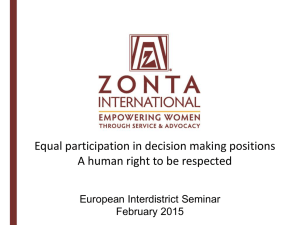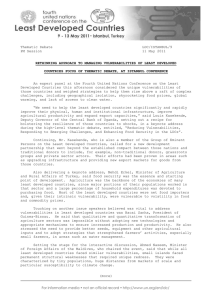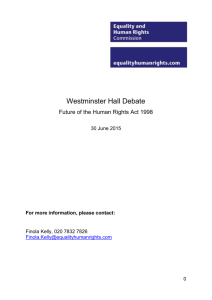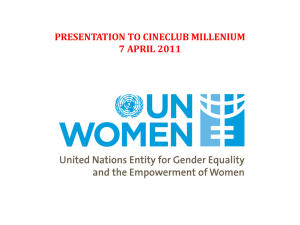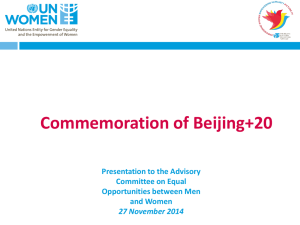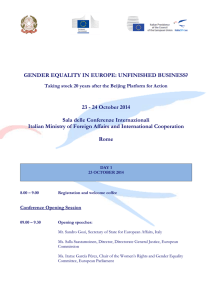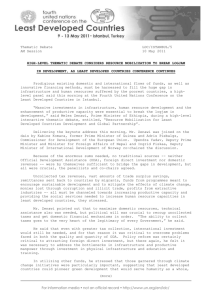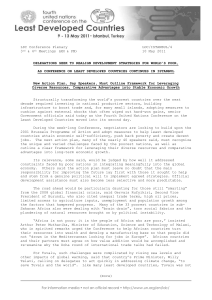Thematic Debate - the United Nations
advertisement
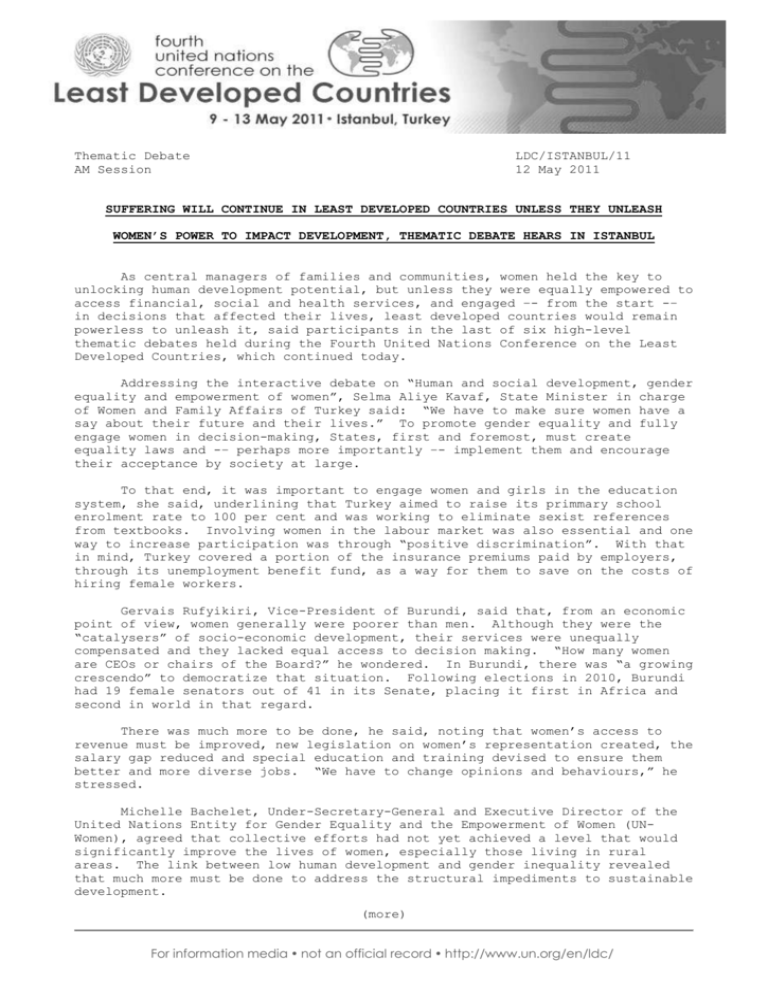
Thematic Debate AM Session LDC/ISTANBUL/11 12 May 2011 SUFFERING WILL CONTINUE IN LEAST DEVELOPED COUNTRIES UNLESS THEY UNLEASH WOMEN’S POWER TO IMPACT DEVELOPMENT, THEMATIC DEBATE HEARS IN ISTANBUL As central managers of families and communities, women held the key to unlocking human development potential, but unless they were equally empowered to access financial, social and health services, and engaged –- from the start -– in decisions that affected their lives, least developed countries would remain powerless to unleash it, said participants in the last of six high-level thematic debates held during the Fourth United Nations Conference on the Least Developed Countries, which continued today. Addressing the interactive debate on “Human and social development, gender equality and empowerment of women”, Selma Aliye Kavaf, State Minister in charge of Women and Family Affairs of Turkey said: “We have to make sure women have a say about their future and their lives.” To promote gender equality and fully engage women in decision-making, States, first and foremost, must create equality laws and -– perhaps more importantly –- implement them and encourage their acceptance by society at large. To that end, it was important to engage women and girls in the education system, she said, underlining that Turkey aimed to raise its primmary school enrolment rate to 100 per cent and was working to eliminate sexist references from textbooks. Involving women in the labour market was also essential and one way to increase participation was through “positive discrimination”. With that in mind, Turkey covered a portion of the insurance premiums paid by employers, through its unemployment benefit fund, as a way for them to save on the costs of hiring female workers. Gervais Rufyikiri, Vice-President of Burundi, said that, from an economic point of view, women generally were poorer than men. Although they were the “catalysers” of socio-economic development, their services were unequally compensated and they lacked equal access to decision making. “How many women are CEOs or chairs of the Board?” he wondered. In Burundi, there was “a growing crescendo” to democratize that situation. Following elections in 2010, Burundi had 19 female senators out of 41 in its Senate, placing it first in Africa and second in world in that regard. There was much more to be done, he said, noting that women’s access to revenue must be improved, new legislation on women’s representation created, the salary gap reduced and special education and training devised to ensure them better and more diverse jobs. “We have to change opinions and behaviours,” he stressed. Michelle Bachelet, Under-Secretary-General and Executive Director of the United Nations Entity for Gender Equality and the Empowerment of Women (UNWomen), agreed that collective efforts had not yet achieved a level that would significantly improve the lives of women, especially those living in rural areas. The link between low human development and gender inequality revealed that much more must be done to address the structural impediments to sustainable development. (more) For information media not an official record http://www.un.org/en/ldc/ Thematic Debate AM Session - 2 - LDC/ISTANBUL/11 12 May 2011 When women had their own income, she explained, they spent 90 per cent of it on the family to meet food, health and education needs. Men, on the other hand, spent just 30 to 40 per cent of their earnings in those areas. Similar ratios were also true for migrants. Improving that scenario required guaranteeing that rural women –- who represented 80 per cent of the agricultrual workforce in some countries -– had equal access to land, credit and other services. Joining the keynote speakers were seven expert panellists, including Shireen Sharmin Chowdhury, State Minister of Women and Children Affairs of Bangladesh; Babatunde Osotimehin, Executive Director, United Nations Population Fund (UNFPA); Irina Bokova, Director General, United Nations Education, Scientific and Cultural Organization (UNESCO); William Lacy Swing, Director General, International Organization for Migration (IOM); Paul De Lay, Deputy Executive Director, Programme, Joint United Nations Programme on HIV/AIDS; Patricia Francis, Director General, International Trade Centre; Thida Khus, Executive Director at SILAKA. When the expert panellists took the floor, several speakers underscored that gender equality was an essential precondition for reducing poverty, achieving sustainable development and fostering good governance. İt must be central to the disbursement of official development assistance (ODA) and employment creation. Further, women’s social, political and economic equality was integral to attaining the Millennium Development Goals, each of which was in jeopardy until equality prevailed. “It is all about sharing a common vision,” said one panellist, while another, despite agreeing, drew attention to the fact that boys often were socialized to take on a dominant attitude towards women and girls. Those attitudes and behaviours related to gender relations, which were central to the fabric of life and progress of nations. Drawing a parallel argument, another panellist pointed out that major gains had been made in the fight against HIV/AIDS, because attitude, behaviour and sexuality –- issues that societies often shied away from discussing -- had been addressed from the start. The AIDS movement had involved and honoured the dignity of affected communities from the start -– “because it is right and because it is effective”. Migrants –- half of whom were women -– taken together would comprise the world’s tenth-largest country, another panellist noted, and Governments must ensure that they returned with new skills and capital to re-invest. They were infused with new ideas, knowledge and technologies, which, on a broad scale, could transform their home economies. In the ensuing dialogue, representatives of Government and civil society alike stressed that young people could be a powerful force for progress, especially when equipped with an education. They were at the heart of solutions to many of the issues being tackled today. Some speakers also cautioned against losing sight of men, whose attitudes towards women and violence were a key determinant of societal values. Technology was another clear answer, said others, especially for helping girls access a better education. Computer use was analytical, rational and mathematical, and afforded girls the opportunity learn in the safety of their homes. That was an especially important benefit for girls who were prevented from attending school. (more) Thematic Debate AM Session - 3 - LDC/ISTANBUL/11 12 May 2011 Co-chairing the high-level interactive debate were Peter Shanel Agovaka, Minister for Foreign Affairs and External Trade of the Solomon Islands, and Steven Vanackere, Deputy Prime Minister and Minister of Foreign Affairs and Institutional Reforms of Belgium. * *** *


